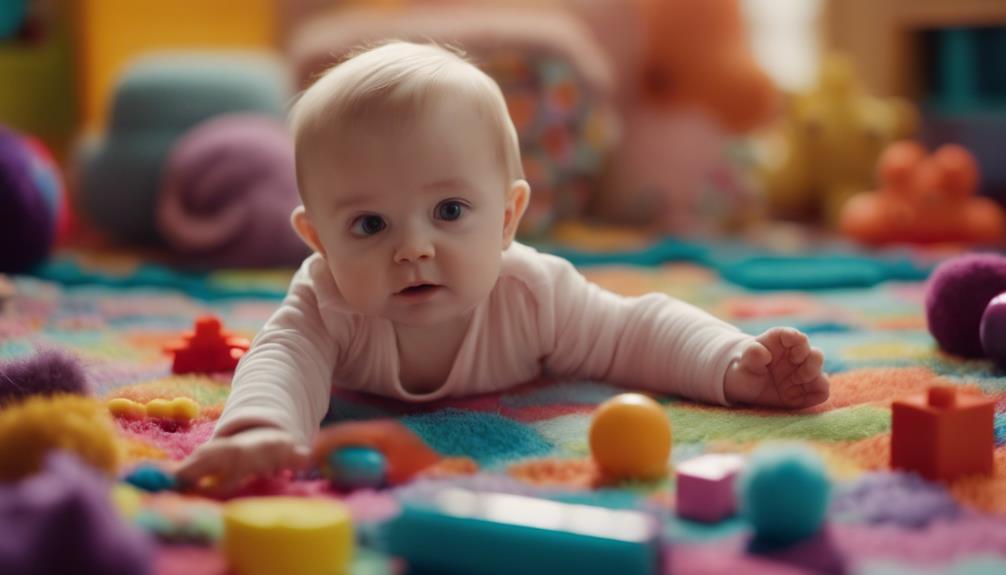To help your baby grow smarter, try fun activities that help with brain development, memory, and language skills. Use sensory play to boost brain connections through touch, sight, sound, taste, and smell. Play interactive games to improve memory and celebrate when they solve problems to boost confidence. Talking, reading, singing, and playing all help with language and thinking skills. Solve puzzles and play games together to help your little one learn and develop critical thinking skills. By engaging in these activities, you can help your baby’s brain grow smarter and stronger. Get ready to see them thrive!
Key Takeaways
- Engage in interactive play to stimulate problem-solving skills.
- Provide sensory experiences for brain development.
- Encourage memory development through playful interactions.
- Foster language skills through everyday activities.
- Celebrate successes to boost confidence and motivation.
Importance of Early Cognitive Stimulation
Early cognitive stimulation lays the essential groundwork for your baby's cognitive development, shaping their learning abilities and problem-solving skills for the future.
The development of a child's cognitive abilities starts from a young age, making it important to provide the right environment that fosters growth.
Research shows that engaging babies in cognitive activities not only promotes brain growth but also strengthens neural connections, setting the stage for enhanced learning capabilities later in life.
By introducing stimulating activities early on, you can help your baby develop essential skills such as attention span, memory retention, and language proficiency.
Cognitive stimulation from birth plays a pivotal role in supporting the child's critical thinking and creativity, which are vital for tackling the complexities of the world.
Therefore, creating a nurturing and intellectually stimulating environment can have a profound impact on your baby's cognitive development, setting a strong foundation for their future learning journey.
Engaging Baby's Senses for Learning

Engaging your baby's senses is essential for their learning journey. By incorporating various sensory experiences like touch, sight, sound, taste, and smell, you're helping them make connections in their brain and understand the world around them.
Using sensory-rich activities such as playing with textured toys, listening to music, and exploring colorful objects can greatly enhance your baby's cognitive development.
Sensory Play Benefits
By involving your baby in sensory play, you're actively engaging their senses to support their cognitive development.
Sensory play encompasses a variety of activities that stimulate your baby's touch, sight, sound, and smell. These experiences not only provide enjoyment but also play an essential role in aiding cognitive development.
Through exposure to different textures, colors, and sounds, your baby's brain connections are stimulated, promoting learning and understanding. Additionally, sensory play helps your baby grasp cause and effect relationships, develop fine motor skills, and enhance problem-solving abilities.
Language development is also fostered as babies explore and interact with the diverse sensory stimuli presented to them. By engaging multiple senses simultaneously, sensory play encourages curiosity, exploration, and overall cognitive growth in your baby.
Multi-Sensory Learning Activities
Utilizing a variety of sensory stimuli can greatly enhance your baby's cognitive development through multi-sensory learning activities.
Sensory play with different textures, sounds, and colors is a vital tool in stimulating brain development in babies. By engaging all of your baby's senses through activities like music, textured toys, and colorful visuals, you can actively support their cognitive growth.
Multi-sensory experiences enable babies to make connections between different stimuli, improving their learning and memory capabilities. Caregivers play an essential role in creating rich learning environments by incorporating various sensory inputs.
These environments help promote cognitive skills in babies, laying a strong foundation for their future learning and development. Through multi-sensory learning activities, you can provide your baby with diverse opportunities to explore and understand the world around them, fostering curiosity and cognitive advancement from an early age.
Sensory Stimulation Techniques
To promote cognitive development in babies, consider incorporating sensory stimulation techniques that engage their senses for learning. Sensory stimulation techniques involve utilizing a baby's senses like touch, sight, sound, taste, and smell to enhance cognitive growth.
Here are some effective ways to engage your baby's senses through sensory play:
- Provide textured toys for tactile exploration.
- Play music to stimulate auditory senses and encourage response to sound.
- Offer different scents like vanilla or lavender to introduce new olfactory experiences.
- Use colorful visuals such as bright contrasting colors to capture and hold your baby's visual attention.
Engaging multiple senses simultaneously can help your baby establish connections between different stimuli, fostering cognitive development. Sensory play not only encourages exploration and curiosity but also aids in problem-solving skills as babies interact with their surroundings.
Promoting Memory Development in Infants

Promote infants' memory development by engaging in interactive activities and playful interactions. Babies begin to develop memory by recognizing familiar faces, anticipating routines, and responding to their names.
Encouraging memory development in infants is vital for their cognitive growth. Through interactions with toys, games, and discussions about daily activities, parents can help infants grasp concepts like object permanence and cause-and-effect relationships.
Playing games like peek-a-boo not only entertains babies but also supports memory development. Varied interactions, such as narrating the baby's actions during playtime, can further stimulate memory retention.
These activities lay the groundwork for problem-solving skills and a deeper understanding of the world around them. By incorporating these simple yet effective strategies into daily routines, parents can foster their infant's memory development, setting the stage for enhanced cognitive abilities in the future.
Encouraging Problem-Solving Skills

Improving problem-solving abilities in infants is essential for their cognitive development and future success. As a parent, you play a vital role in helping your child develop these skills. Here are some ways you can encourage your child to enhance their ability to understand and solve problems:
- Provide toys or activities that challenge: Offering toys or activities that require your child to figure out how things work or fit together can help them develop problem-solving skills.
- Offer simple challenges: Encourage your child to reach goals by setting simple challenges that require them to think and solve problems.
- Model problem-solving behaviors: Show your child how to approach and solve problems by demonstrating problem-solving strategies in your own daily tasks.
- Celebrate successes: Acknowledge and celebrate your child's achievements when they solve a problem, as this boosts their confidence and motivates further learning.
Everyday Teachable Moments for Babies

Engaging with your baby through daily activities like talking, reading, and singing provides valuable opportunities for their cognitive development. These simple interactions help build your baby's language skills and strengthen the neural connections in their brain. Additionally, interactive play such as peek-a-boo and hide-and-seek can promote cognitive skills by encouraging problem-solving and memory retention.
| Everyday Teachable Moments for Babies | |
|---|---|
| Activities | Benefits |
| Talking | Stimulates language development |
| Reading | Enhances cognitive skills |
| Singing | Encourages musical and emotional growth |
| Peek-a-boo and Hide-and-seek | Promotes problem-solving skills |
Incorporating colorful picture books into your daily routine can help stimulate your child's visual perception and cognitive growth. These books not only enhance their imagination but also improve their attention span and memory. Through these activities, your child might develop a love for learning and exploring, setting a strong foundation for their cognitive abilities.
Parent-Child Cognitive Development Activities

Encourage cognitive development in your child through interactive activities that stimulate learning and growth. By engaging in various activities, you can help your child to develop essential cognitive skills.
Here are some effective ways to promote cognitive development:
- Play Together: Spend quality time playing with your child to help them learn and grow.
- Help Your Child: Offer age-appropriate puzzles, shape sorters, and matching games to encourage problem-solving skills.
- Objects Around: Foster language skills by naming objects in your child's daily environment and engaging in conversations.
- Memory Development: Promote memory development through memory games, repeating routines, and introducing new experiences.
Building Thinking Skills Through Play

To enhance your baby's cognitive development, focus on building thinking skills through interactive play activities. Help your baby's development by providing toys or rattles that encourage exploration and problem-solving. Play is an essential aspect of a child's development, as it allows them to engage with their environment, learn new concepts, and develop essential cognitive abilities. By engaging in activities like peek-a-boo or naming objects during playtime, you can stimulate your baby's curiosity and understanding, thereby fostering their cognitive growth.
Learning and Development go hand in hand during playtime, as babies use visual and tactile stimuli to make sense of the world around them. By creating a safe and nurturing play environment, you give your baby the opportunity to explore, experiment, and develop their cognitive skills. Interaction through play aids in building problem-solving skills and enhances your baby's ability to think critically.
Encourage interactive play activities to support your baby's cognitive development and lay the foundation for future learning.
Frequently Asked Questions
How to Encourage Cognitive Development in Infants?
To encourage cognitive development in infants, engage in interactive play, encourage exploration, talk, read, sing, and play daily. Provide colorful objects and soft toys for stimulation. Maintain consistent routines to support cognitive growth in your baby.
How Does Talking to Your Baby Help Cognitive Development?
Talking to your baby sparks their cognitive growth. Through verbal exchanges, you nurture their language skills and comprehension. Engage in conversations to foster brain development and build a strong foundation for future learning.
What Are Examples of Cognitive Development in Infants?
To encourage cognitive development in infants, engage in activities like peek-a-boo, passing toys between hands, and recognizing people. Place toys within sight but out of reach to promote exploration and memory recognition.
What Is Cognitive Thinking in Early Childhood?
In early childhood, cognitive thinking involves the mental processes of learning, understanding, and problem-solving. It includes skills like attention, memory, language development, and reasoning abilities. Encouraging cognitive development in babies and toddlers is crucial for their future success.
Conclusion
To sum up, engaging in cognitive development activities with your baby from an early age can have a lasting impact on their learning abilities.
For example, a study conducted by researchers at Harvard University found that infants who participated in interactive play sessions with their parents showed significant improvements in problem-solving skills compared to those who did not.
By incorporating simple yet stimulating activities into your daily routine, you can help nurture your baby's cognitive development and set them up for success in the future.










